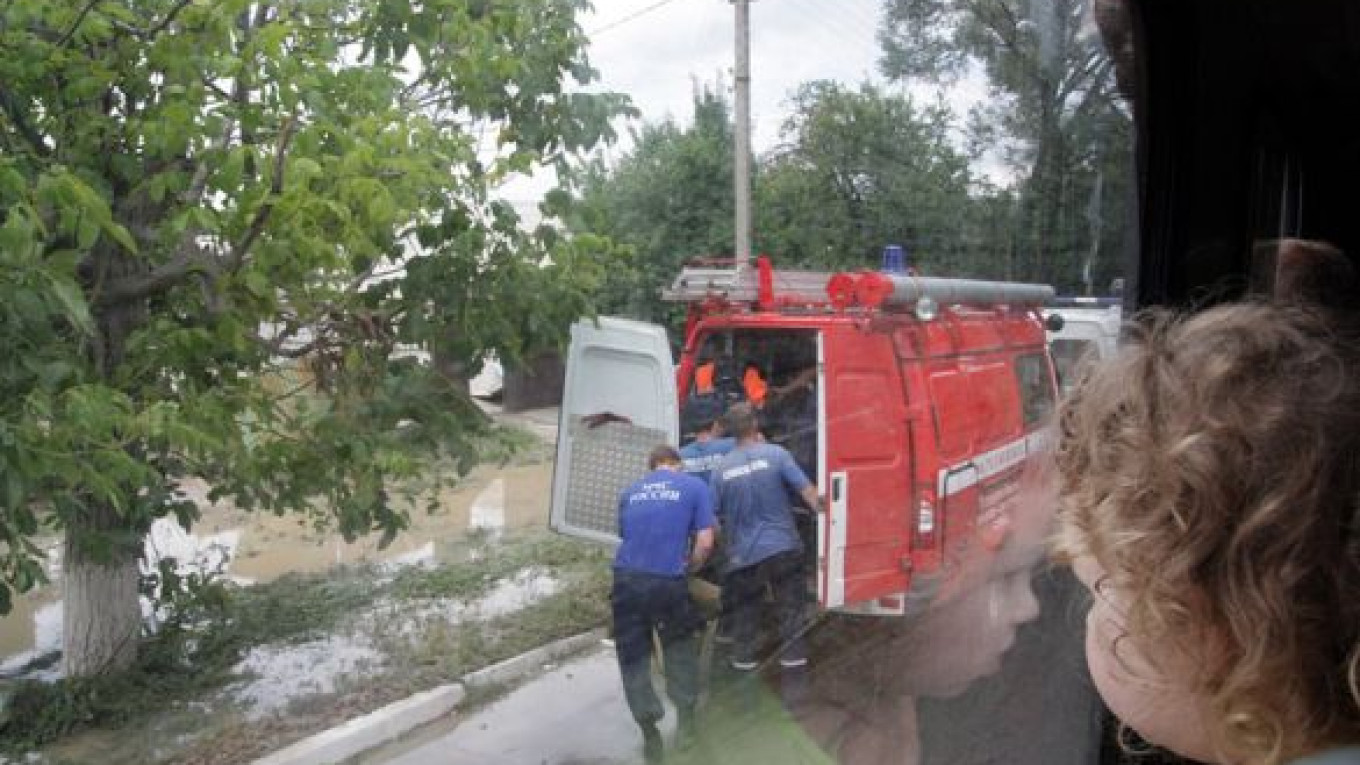Floods swept through a Krasnodar region resort town early Wednesday, killing four people and? swamping roughly 600 homes less than two months after flooding in the same region claimed the lives of more than 160 people.
Wednesday morning's flooding came after torrential rainfall swept over the Krasnodar region, causing the Nechepsukho, Plyakho and Psebe rivers to overflow their banks, local emergency officials said in a statement on the government ministry's website.
Krasnodar police said in a statement that they first received warning of rising water levels at 2 a.m. and had evacuated 1,500 people three hours later. More than 1,350 rescue workers were mobilized as part of efforts to combat the natural disaster, emergency officials said.
Police said they discovered the bodies of four people while going from house to house in the town of Novomikhailovsky to warn citizens of the danger from the flooding.
The victims included an 84-year-old local woman, a 22-year-old man from Moscow who was in a stadium in Novomikhailovsky when the storm hit, and a 44-year-old woman from St. Petersburg and a 46-year-old man from Krasnodar found together in a car, investigators told Interfax.
A statement released by the regional administration said three people remained missing in the wake of the floods, which also affected the nearby villages of Tenginka and Lermontovo. But an Investigative Committee spokesman later denied that anyone had been reported missing, Interfax reported.
By 7 a.m., the flooding had subsided and all homes were free of water, emergency officials said, adding that a state of emergency remained in force.
Following harsh censure of authorities' response to massive flooding that hit the region in early July, local prosecutors were quick to announce plans to check whether the government had fulfilled its legal obligations to protect citizens from impending disaster.
Krasnodar region Governor Alexander Tkachyov, who faced a storm of criticism over his administration's response to the last bout of flooding, rushed to tell his Twitter followers that he had stayed up to monitor the situation.
"The region hadn't managed to recover from one set of floods when the elements struck us once again. Now nature is really testing our endurance," Tkachyov tweeted Wednesday morning.
In early July, 168 people died in the Krasnodar region towns of Krymsk and Gelendzhik and the city of Novorossiisk in the worst flash flooding to hit the region in 70 years. Three local officials, including former Krymsk Mayor Vladimir Ulanovsky, have been arrested after investigators opened a criminal case on negligence charges.
But angry locals refuted Tkachyov's claims that the region's disaster-warning system had worked effectively.
“There was no early warning. When it started to flood, they turned off all mobile phone coverage. The landlady said the sirens made noise but were barely audible,” wrote Twitter user @inconsta, who said on the microblogging service that she was in Novomikhailovsky when the flooding began.
Back in Moscow, Emergency Situations Minister Vladimir Puchkov gave orders to organize rescue teams, provide necessary medical assistance and maintain law and order, according to a separate statement released by the ministry.
"People shouldn't have to go searching for help; help should come to every home," Puchkov said, according to the statement.
Related articles:
A Message from The Moscow Times:
Dear readers,
We are facing unprecedented challenges. Russia's Prosecutor General's Office has designated The Moscow Times as an "undesirable" organization, criminalizing our work and putting our staff at risk of prosecution. This follows our earlier unjust labeling as a "foreign agent."
These actions are direct attempts to silence independent journalism in Russia. The authorities claim our work "discredits the decisions of the Russian leadership." We see things differently: we strive to provide accurate, unbiased reporting on Russia.
We, the journalists of The Moscow Times, refuse to be silenced. But to continue our work, we need your help.
Your support, no matter how small, makes a world of difference. If you can, please support us monthly starting from just $2. It's quick to set up, and every contribution makes a significant impact.
By supporting The Moscow Times, you're defending open, independent journalism in the face of repression. Thank you for standing with us.
Remind me later.


